
News & Insights
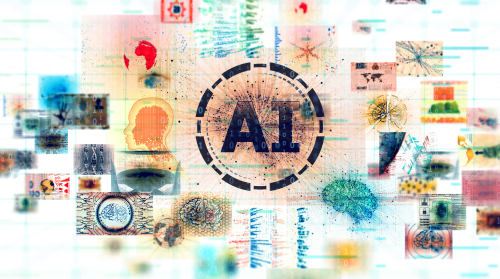
The Era of Generative AI: My trust becomes even more important
Jessica Espinosa & Nicolas Zahn • November 2023
2023 has been the “boom” year of Generative Artificial Intelligence (AI). This type of AI focuses on generating original and creative outputs, such as texts, images, music, and much more. Already in use in multiple digital apps, this technology will massively increase everyone’s exposure to the opportunities, capabilities, and challenges of AI, affecting all of us in many aspects of our everyday lives.
From academia and education to social media and the music industry, generative AI sets out to change the world. Presenting immense opportunities for innovation, spurring human and industry development, generative AI also raises delicate questions about privacy and intellectual property rights, inclusivity, transparency, and accountability. In addition, the probability of spreading disinformation and misinformation (including the creation of new songs by replicating artists’ voices) has triggered heightened political attention and pressure to govern and regulate AI.
Just last week, between October 30th and November 3rd, G7 leaders welcomed the Hiroshima AI Process Comprehensive Policy Framework as international guiding principles for AI, the Bletchley Declaration from the AI Safety Summit was adopted by 28 countries and the European Union and the United States presented and Executive Order that explicitly mentions the intent to “Develop standards, tools, and tests to help ensure that AI systems are safe, secure, and trustworthy”. Those developments together with an overview of the current global discourse, challenges, and opportunities for AI use from the public sector to education and governance were also discussed at the AI Policy Summit at ETH Zürich that brought together practitioners, academics, and policymakers from over 100 countries.
Although all of these developments are positive frameworks aiming to encourage transparency and accountability from AI developers to measure, monitor, and mitigate potential harm, the multiplicity of initiatives and policy proposals also leads to uncertainty for companies developing and implementing AI. Likewise, customers of digital products and services using AI are still mostly in the dark about what AI means for them. Customers and users of the digital space are demanding more and more transparency in the technology they use. They want to be aware of the privacy policies, the algorithms behind the processes and, in general, how trustworthy the technology is.
At the Swiss Digital Initiative, we have developed a practical solution to address transparency and trustworthiness in digital technology: the Digital Trust Label. Developed as a tool for companies to denote that they are transparent about the technology employed, particularly when it comes to the use of AI algorithms, the Digital Trust Label builds trust between the users and digital technology providers. When it comes to AI, a recent study by the University of Basel confirms that “the presence of a certification label significantly increases participants’ trust and willingness to use AI”. Hence, the Label is both a solution to increase trust in the digital world and a way to exert the development of ethical, safe, and inclusive AI algorithms.
Learn more about the Digital Trust Label https://digitaltrust-label.swiss/

SDI welcomes Nicolas Zahn as new Managing Director
SDI • October 2023
Starting October 1st, the Swiss Digital Initiative is thrilled to introduce Nicolas Zahn as its new Managing Director.
Nicolas Zahn has been an integral part of SDI for the past two years, overseeing interactions with our Digital Trust Expert Group and representing SDI in various working groups. With expertise on digital transformation’s political, social and economic consequences, and a deep understanding of digital trust and artificial intelligence, we cannot think of a better fit to lead this new chapter for the Swiss Digital Initiative.
As Nicolas embarks on his journey as Managing Director, we remain committed to advancing the discourse on Digital Trust, both domestically as well as on the international stage. We will continue to provide valuable in-depth insights and practical tools, including the Digital Trust Label, for organisations seeking to bolster their digital trust practices.
The SDI team would like to express our deepest appreciation for Fathi Derder’s leadership and contributions throughout his time with us. We wish him the very best in his exciting new role as producer and host of “Le Grand Soir” at RTS!
🚀 Stay tuned for exciting projects and developments in this new chapter of SDI!

Turning Data Protection from Compliance to Advantage
Nicolas Zahn • August 2023
Per 01.09.2023 the new Federal Act on Data Protection will come into force. What does the new law tell us about the regulatory realities in the digital economy, what is the link between data protection and digital trust, and why might it be time to think about data protection differently?
Organisations big and small are scrambling in Switzerland to comply with the new Federal Act on Data Protection (nFADP) that enters into force beginning this September. The new provisions mark a clear change from the old act on data protection that goes back to the 1990s, a time where communicating digitally was still a rare sight and postcards were more dominant than email as the internet age was just about to begin. The new act is supposed to give individuals better protection and guarantees when it comes to how their personal data is being handled by authorities and corporations (see e.g. the overview by the FDPIC here)
Global developments, local effects
However, another aspect of why the law – after several revisions and consultations – is now being updated is linked to the European Union. Given that Switzerland participates in the European single market but is not a member of the European Union, it is essential for smooth operations that the legal situation in Switzerland is seen as equivalent to the European regulations. This was no longer the case in terms of data protection as the European Union had set the global de facto standard for data protection legislation with the General Data Protection Regulation, GDPR. The new Swiss legislation takes inspiration from GDPR but differs in a few crucial aspects e.g. it continues to follow the Swiss approach of allowing data processing unless explicitly forbidden by law whereas the GDPR requires a legal basis for data processing. Nevertheless, the new Swiss legislation is a huge step forward in terms of data protection and certainly many organizations will have to invest time and resources to ensure compliance with the new framework.
It all starts with data and trust
Data protection is often at the core of digital policy debates since data is at the core of the digital economy. Digital businesses need data, from logistics and operations in a factory to marketing campaigns on social media. Hence, getting the regulation of data processing right is crucial for the digital economy. Given the sensitive nature of many data points that are used on a daily business in today’s digital economy and the value that data presents to companies, it is also essential that data protection frameworks manage to create trust between data providers – often individuals – and data processors – the companies offering digital services. Only if I feel that my data is handled responsibly, e.g. because I know that there are severe punishments for companies that fail to do so, am I willing to share and contribute data. Unfortunately, the last years with countless scandals involving sloppy data handling have severely undermined the trust relationship between data providers and data processors.
This is exactly why in our work on digital trust, data protection plays a crucial role. If there is no trust regarding data involved in a digital service, there can be no sustainable relationship between a consumer and a digital service provider. Data Protection is one of the four dimensions our Digital Trust Label assesses and it follows established standards such as GDPR when it comes to the relevant auditing criteria. Organizations that opted early on to go through the labelling process thus had an advantage when it comes to complying with the new Swiss legislation on data protection as many questions that they need to ask themselves already became clear when looking at our criteria catalogue: it pays to address digital trust as early as possible, especially in a quickly shifting regulatory environment like the one we are experiencing at the moment.
From nuisance to asset
But purely framing the issue of data protection as a question of compliance would be a missed opportunity. As with digital trust more generally, investing in data protection and using it as a way of thinking clearly about the relationship between consumers and digital service providers can provide advantages in the marketplace. With not only growing regulatory pressure but also increased user awareness, it pays to proactively address data protection and see it not necessarily as a nuisance to comply with but an asset for the own company. The Swiss Digital Initiative had the opportunity to present its work at a conference organised around this exact argument by MD systems. Read more in their blog about the event.
To learn more about our work, see here.

We are looking for a Project & Research Coordinator (80%-100%) - Application closed
Young Faul-Kim • June 2023
The Swiss Digital Initiative (SDI) is an independent, non-profit foundation based in Geneva, founded in 2020 by digitalswitzerland and under the patronage of Federal Councillor Ueli Maurer. The SDI pursues concrete projects with the aim of securing ethical standards and promoting responsible conduct in the digital world. It brings together academia, government, civil society and business to find solutions to strengthen trust in digital technologies and in the actors involved in ongoing digital transformation. In January 2022, SDI launched the world’s first Digital Trust Label.
For our Geneva office, starting as soon as possible / by agreement, we are looking for a:
Project & Research Coordinator (80%-100%)
We are searching for an enthusiastic, motivated, and proactive doer and thinker:
Bachelor’s/Master’s degree in International Relations, Development Studies, Political Science
At least 3 years of professional experience
Good communication and interpersonal skills
Fast learner who works independently, and acts proactively
Interest and knowledge of new technologies and their ethical implications
Proficient in spoken and written English, basic knowledge of French is an asset
Familiarity with the organisations history, work and processes is an asset
Your responsibilities will include:
Provide project management support, e.g. conceptualisation and design of tools, projects, and activities, including the handling of third-party providers, partners, and other relevant stakeholders.
Handle incoming inquiries regarding the organisation, projects, and potential collaborations.
Support in the organisation and logistics of various presentations, meetings, and events.
Manage communication with a variety of stakeholders (from the private and public sector, civil society, academia, etc.)
Conducting research and preparing analyses on issues related to technology. E.g. digital ethics and responsibility, artificial intelligence, and digital trust.
Support communication activities, e.g. newsletters, blog articles, social media content, marketing material, and awareness campaigns.
We offer you a flexible workplace in the heart of Geneva with the possibility to work remotely. From day one you can work independently, you will be able to further develop your skills and professional network, take on responsibility, contribute your individual strengths, master interesting challenges, and support in building a new organization with a purposeful mission.
If you are interested in this position, please send a copy of your CV, a letter of motivation including a brief statement of purpose describing what you expect from the position, and your availability to Nicolas Zahn, Senior Project Manager: nicolas@sdi-foundation.org. We look forward to receiving your application until Friday, 28 July 2023, (incoming applications will be considered on an ongoing basis).
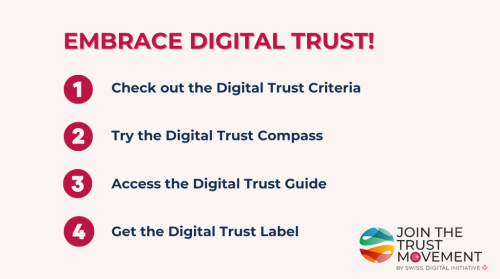
The SDI launching the Digital Trust Movement at VivaTech Paris 2023
Young Faul-Kim • June 2023
Building up the Trust Movement, from Geneva to the world
Geneva/Paris, June 13, 2023 – The Swiss Digital Initiative (SDI) launches the Trust Movement at Viva Technology Paris (June 14th). A campaign to raise awareness of the importance of trust in a digitised world, based on practical digital trust tools available to organisations and individuals: the Digital Trust Criteria Catalog, the Digital Trust Guide, the Digital Trust Compass and the Digital Trust Label.
In today’s increasingly interconnected and technologically driven world, the concept of trust assumes paramount importance. Trust, a fundamental aspect of human relationships, extends its significance to the digital space, where it becomes the cornerstone of interactions, transactions, and the overall functioning of digital systems. As technology advances at a rapid pace, the need to address the interplay between trust, ethics, and the digital landscape has become a pressing concern.
Recognising the criticality of trust and ethics in the digital world, the Swiss Digital Initiative has emerged with a compelling mission. Founded in 2020 at the World Economic Forum, the SDI aims to shape a more inclusive and ethical digital future with diverse tangible and practice-oriented projects.
The Digital Trust Movement: An awareness campaign based on four digital trust tools
In June 2023, the SDI is officially launching the Digital Trust Movement to raise awareness of the importance of digital trust targeting organisations providing digital services and its end-users, based on four tools:
The Digital Trust Criteria Catalog: an expert group led by the Ecole Polytechnique Fédérale de Lausanne (EPFL) has compiled a catalog of 35 criteria aimed at building up the trust for users of digital services. The criteria are based on four categories: security, data protection, reliability, and fair user interaction. *See the Catalog *here.
The Digital Trust Guide: based on the Catalog, SDI has created a ‘user guide’ to digital trust. This guide is designed to assist, be it businesses or institutions, that handle user data. The primary objective is to establish a robust framework of trust that safeguards the interests of users. *See the Guide *here.
The Digital Trust Compass: SDI has developed an online self-assessment tool to determine whether your organisation respects and protects the interests of its users and to assess the level of digital trust awareness among end-users. It serves as a compass, guiding you along your digital trust journey, providing the right direction. The tool consists of 20 precise questions, with answers on a scale of 1 to 10, based on the Criteria Catalog. *Try out the Compass *here.
The Digital Trust Label: to go beyond self-assessment and certify compliance with the criteria established for gaining the trust of service users, SDI launched a label in 2021. The Digital Trust Label, the first of its kind, signifies the trustworthiness of a product in a clear and visible manner. The Label is exclusively awarded to organisations that meet the 35 criteria after undergoing an audit conducted by an independent body.* Learn more about the Label here.
From Geneva to the world!
Geneva is the ideal base for a Digital trust movement. Switzerland, its scientific excellence, its prosperity, its innovative strength, its culture of dialogue, its diplomatic tradition, and its neutrality, at the heart of Geneva, capital of peace and humanitarian law. By launching the Trust Movement and offering a suite of practical tools, the Swiss Digital Initiative aims to empower organisations and individuals to cultivate digital trust in their everyday interactions. Through collaboration, awareness, and the application of ethical principles, the SDI envisions a digital landscape characterised by transparency, reliability, and user-centricity. As technology continues to shape our world, the promotion of digital trust is crucial to foster an inclusive and trustworthy digital future.
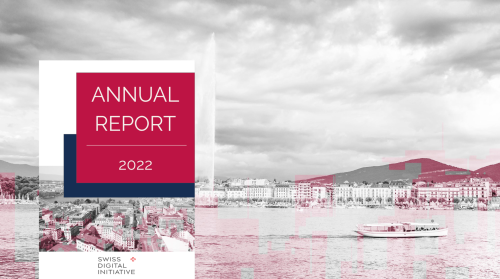
Annual Report 2022: SDI, contributing to a global movement for digital trust
Young Faul-Kim • May 2023
SDI, contributing to a global movement for digital trust
The year 2022 marked numerous milestones for Swiss Digital Initiative and signified our projects into the global arena. In January, SDI successfully launched the world’s first Digital Trust Label, putting trust, simplicity and transparency into technology. Since then, six organisations have embarked on the digital trust journey with SDI and were awarded the Digital Trust Label.
Annual Report 2022 Highlights
January, launched the Digital Trust Label
6 organisations (Swisscom, Swiss Re, Credit Suisse, People Week, Credit Exchange, Kudelski IoT) became Digital Trust Pioneers by being awarded the Digital Trust Label
With Institute for Management Development (IMD) in Lausanne, SDI officially launched the Corporate Digital Responsibility Starter Kit
Engaged in 15 national and international events to promote SDI’s projects, expand our network, and exchange knowledge and expertise.
Outlook 2023
Digital Trust Movement
Our aim for 2023 is to pilot digital trust from Switzerland to the rest of the world by leveraging our expertise. SDI is very thrilled to go one step further for a more secure and sustainable digital future. The Digital Trust Movement is an awareness campaign, targeting organisations and end-users. It is based on three pillars:
Expertise: SDI has developed a unique expertise in defining, measuring, and certifying digital trust and is building a network with partners in key hubs worldwide to strengthen this expertise.
Tools: SDI has launched the Digital Trust Label (2022), the first label that denotes the trustworthiness of a digital service, followed by the Digital Trust Compass (2023), a free tool online to show the path to digital trust and the best practices in corporate governance.
Outreach: The Digital Trust Movement promotes the importance of digital trust, and shares expertise and tools developed on social networks
Solid Partnerships
Thanks to our great partners, SDI has been able to successfully achieve our goals and milestones so far. As we look towards 2023, we aim to cultivate even stronger partnerships, both domestically and internationally, to solidify further our mission to develop a robust digital trust ecosystem.
Participating in global conferences, events
Our strategy to advance our objectives involves attending various global conferences and events at regional and international levels. This would enable us to display SDI’s work and connect with other experts in the field. Furthermore, we intend to organise our own events in 2023, to share our knowledge and activities.
The full report is available here.
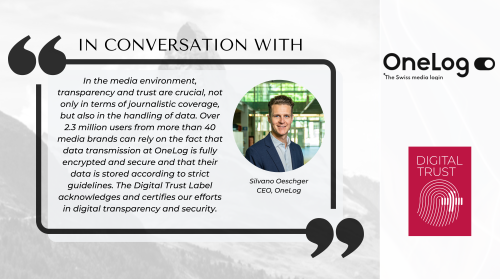
The Digital Trust Label is awarded to OneLog!
Jessica Espinosa • June 2023
OneLog is the joint login service for the federation of the largest Swiss media companies and publishing houses, the Swiss Digital Alliance. With just a single login, OneLog provides access to a varied and constantly expanding range of digital media services. With more than 2 million users, by being awarded the Digital Trust Label, OneLog shows its commitment to guaranteeing and providing the highest standards of security and data protection.
In January 2022, the Swiss Digital Initiative introduced the first-in-the-world actionable tool to advance digital trust, the Digital Trust Label. Based on a 3rd party audit using 35 criteria across 4 dimensions: Security, Data Protection, Reliability and Fair user interaction, a digital service is considered trustworthy and is awarded the Label if it meets all the criteria. After undergoing a detailed and extended audit process, OneLog received the Digital Trust Label. To get further insight into OneLog’s work and commitment to trustworthy digital services, SDI had the opportunity to have a conversation with Silvano Oeschger, OneLog’s CEO. Here is what we talked about:
To begin with, please explain to us OneLog’s uniqueness as a digital service provider
OneLog supports Swiss media companies to (re)establish a direct relationship with users and improve the basis of 1st party data. The solution offers advantages both for the users and for the media companies involved. Users benefit from the fact that they can access all online offerings with a single registration. Their personal data can be managed in a central user cockpit. OneLog is, of course, fully compliant with data protection and has the highest security standards and is always kept up to date, while offering features such as TouchID, FaceID, or 2 FactorVerification. The media companies benefit from the expansion of their respective 1st party data basis, whilst no data exchange takes place between the media companies.
You successfully completed an audit which is based on 35 criteria within the categories of security, data protection, reliability and fair user interaction. Why was it important to guarantee that your services are trustworthy, transparent and ethical with the Digital Trust Label?
Especially in the media environment, transparency and trust are crucial, not only in terms of journalistic coverage but also in the handling of data. Over 2.3 million users from more than 40 media brands can rely on the fact that data transmission at OneLog is fully encrypted and secure and that their data is stored according to strict guidelines. The Digital Trust Label acknowledges and certifies our efforts in digital transparency and security.
When we go into your website, we can see that OneLog is beyond committed to providing full security to your users. From your perspective, how are digital security and digital trust intertwined?
For us, digital security goes hand in hand with digital trust. For OneLog, security has been a top priority since the beginning because we handle an essential asset for the media we serve – their clients’ registration and login data.
You are now officially part of the Digital Trust Label Pioneers. For you, what does it entail to be a pioneer in digital trust?
As I said before, digital trust is essential, especially in the media world, and that’s why we were keen to be among the first to join this important initiative. At the same time, it is also a strong signal to the users of OneLog and our further potential media partners.
At OneLog, we are committed to the highest security standards, and all functions and processes have been designed along the strictest data protection guidelines and validated by our own DPO.
How does OneLog guarantee that its products and services are developed and maintained in a secure, reliable and trustworthy manner?
We implemented a comprehensive security and quality management system that includes secure and up-to-date software development practices, measures to protect user data and ensure compliance with data privacy regulations, regular security testing and assessments to identify vulnerabilities, and a bug bounty program in which hundreds of friendly hackers help us to keep the platform secure, reliable and trustworthy.
What do you think is going to be important for users in the future to maintain and create trust in digital environments?
I believe that transparency in the handling and use of data is one of the most important prerequisites for creating digital trust. Particularly because large digital platforms have handled data disreputably in the past, users have rightly become more critical. It is, therefore, of immense importance that users can easily get an idea of how their data is processed and used.
**
Check out more on OneLog: https://onelog.ch/en/
Join OneLog and all our Digital Trust Pioneers!
Embrace Digital Trust and get the Digital Trust Label – https://digitaltrust-label.swiss/
Follow the Swiss Digital Initiative on social media
Twitter: @sdi_foundation LinkedIn: Swiss Digital Initiative
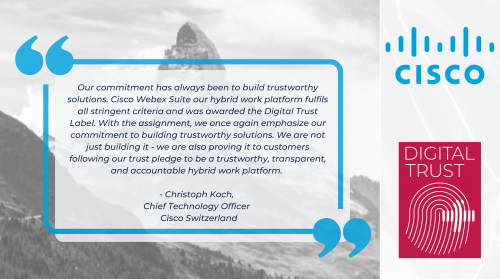
Cisco’s Webex Suite is awarded the Digital Trust Label!
Jessica Espinosa • March 2023
CISCO is one of the leading multinational digital communications technology corporations, and Webex Suite is one of the most used collaboration and remote-working solutions CISCO offers. As one of the first companies with a big presence worldwide to receive the Label, CISCO’s leadership is undoubtedly setting a benchmark of credibility and contributing to building and promoting Digital Trust in the increasingly digitalised world we humans are immersing in.
In January 2022, the Swiss Digital Initiative introduced the world’s first-of-its-kind label assessing the trustworthiness of digital services, the Digital Trust Label. According to the dimensions of security, reliability, data protection and fair user interaction, the Digital Trust Label indicates the trustworthiness of a digital service in a clear, visual and non-technical language everyone can understand. Hence, after undergoing a detailed audit process, Cisco’s Webex Suite received the Digital Trust Label. To get a deep dive into Cisco’s commitment to trustworthy digital services and leading global role in digital communications, we asked Christoph Koch, Chief Technology Officer at CISCO Switzerland, some questions.
Before we begin, let me congratulate you and the Cisco team for successfully completing the audit and being awarded the Digital Trust Label. Definitely, this sets a new standard as Webex is the first videoconferencing and hybrid working platform to obtain the Label. So please tell us, why was it important for you to give that extra guarantee of the trustworthiness of this service with the Digital Trust Label?
Based on new modern hybrid work requirements, collaboration and communication needs are demanding cloud-delivered services everywhere. Webex is the most powerful platform for voice/video calling, online meetings, messaging, and events in the cloud for teams of all sizes.
As the new Swiss data protection law discussions picked up speed over a year ago, it was clear to us we wanted to prove the trustworthiness of our Cisco solutions to anyone. The Swiss Digital Trust label is the perfect initiative to help us achieve this goal, and we are now proud to have been awarded this Digital Trust Label for the whole Cisco Webex suite.
And, from your perspective, what does it mean to be trustworthy?
For me being trustworthy means being transparent and accountable as to what you do. Cisco is strongly committed to building trustworthy solutions and one clear example is our Webex Suite hybrid work platform.
Undoubtedly, the COVID-19 pandemic has changed the game for online conference platforms, as much as it has for digital trust. How did Webex manage to stay at the forefront in terms of security and reliability?
Webex used to be and still is the most trusted and secure conferencing and messaging platform. The pandemic did not change that at all. What the pandemic did was push innovation with respect to usability, comfort and inclusiveness with features like noise cancelling, own voice selection, real-time translation or covid relevant use cases.
As you know, the Digital Trust Label base its criteria on four categories, one of these being fair user interaction which in part looks into the use of Artificial Intelligence (AI) and machine learning algorithms by digital services. As you integrate industry-leading AI, in your opinion, what is key to guaranteeing the robustness, resilience, and accuracy of such algorithms?
Webex devices and the Webex App employ collaboration AI software that makes them easier to use and provides value-added functions by using the device’s microphone, speaker and camera. At Cisco, we are committed to managing AI development in a way that augments our focus on security, privacy, and human rights. The Cisco Responsible AI initiative and framework governs the application of responsible AI controls in our product development lifecycle, how we manage incidents that arise, engage externally, and its use across Cisco’s solutions, services, and enterprise operations. We base our Responsible AI initiative on principles consistent with Cisco’s operating practices and directly applicable to the governance of AI innovation. These principles—Transparency, Fairness, Accountability, Privacy, Security, and Reliability—are used to upskill our development teams to map to controls in the Cisco Secure Development Lifecycle and embed Security by Design, Privacy by Design, and Human Rights by Design in our solutions. And our principle-based approach empowers customers to take part in a continuous feedback cycle that informs our development process.
More information: Webex Advanced Collaboration features Providing Amazing User Experiences while Protecting Privacy and Our Responsible Approach to Governing Artificial Intelligence
Creativity and Innovation are clearly at the heart of the digital world and technology. When developing new digital solutions, What should businesses/organisations keep in mind to guarantee that these are trustworthy?
IT solutions are often designed for solving a specific problem or task, but don’t consider all other constraints like user experience or data privacy that come along with them. If software incorporates data privacy and security by design and by default, you have multiple benefits: First, you are automatically following the EU GDPR guidelines and are aligned with the law, secondly, you don’t need to re-design your application afterwards and invest a lot of money and thirdly, you have an advantage over your competition who may not have done that. Obviously, certifications such as the EU Cloud Code of Conduct or the Swiss Digital Trust label help proving that your solutions are following these standards.
And finally, in your perception, what is needed to improve digital trust?
One of the key elements is education and knowledge – only if people have a good understanding of the solutions and applications they are using, they can start trusting them. This is particularly important when society is confronted with new phenomena like ChatGPT which are considered the “Holy Grail” or the “end of humanity” depending on who you ask. That being said, there is also a certain responsibility of the media to inform the population objectively about these new trends without creating anxiety and uncertainty.
**
To learn more about the Digital Trust Label, visit: https://digitaltrust-label.swiss/ **
Follow the Swiss Digital Initiative on social media
Twitter: @sdi_foundation LinkedIn: Swiss Digital Initiative
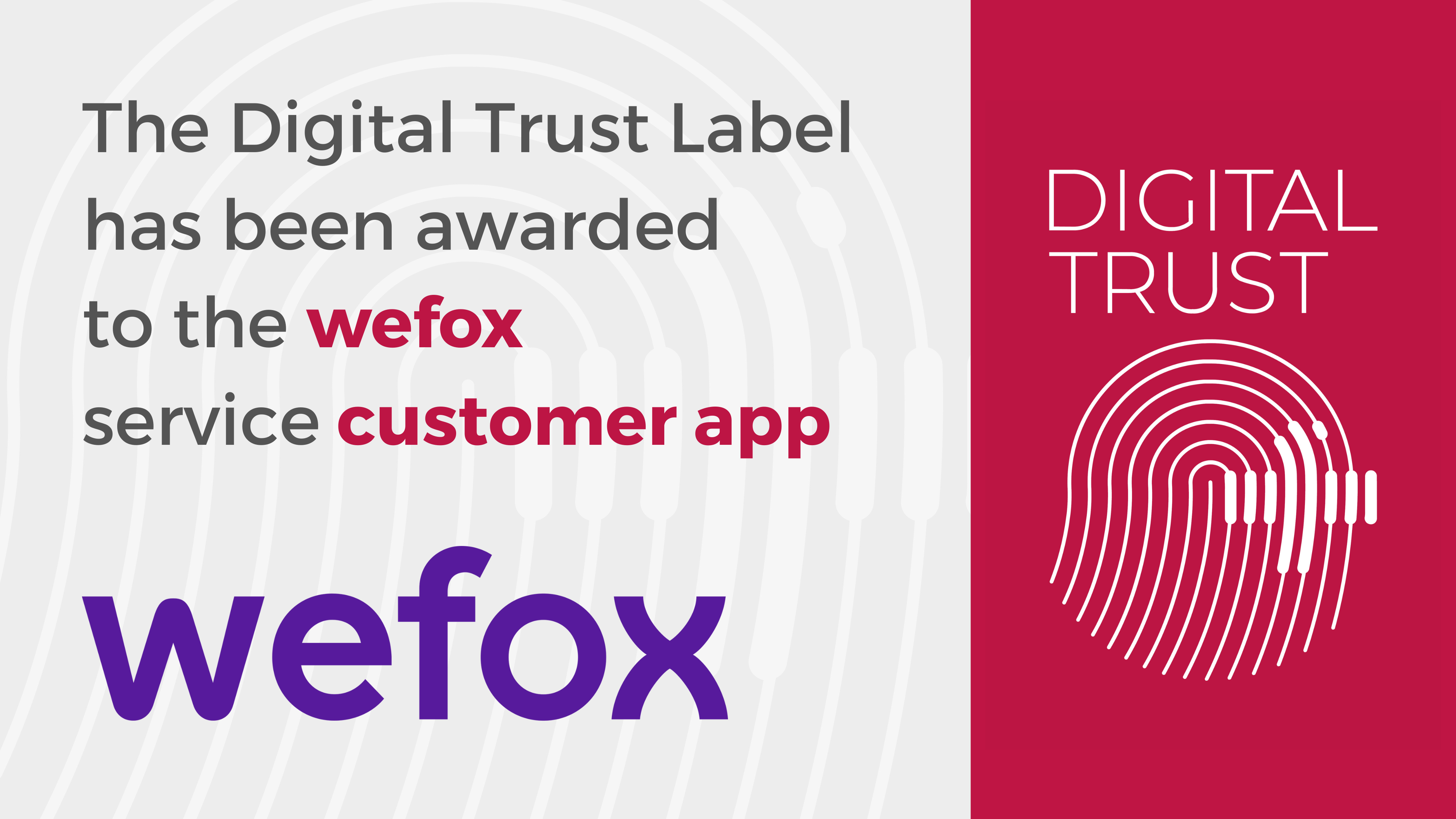
The world’s first Digital Trust Label (created in Switzerland) expanded to Germany through wefox!
Jessica Espinosa - February 2023
From Switzerland to the world, the Digital Trust Label wants to empower users everywhere to feel safe and secure when they use digital services and give companies a way to denote their trustworthiness by conveying their commitment to ethics and transparency. Most recently, the world’s first Digital Trust Label (created in Switzerland) has now been expanded to Germany through Europe’s unicorn start-up wefox. After undergoing an extensive audit, the successful European insurtech start-up wefox received the Digital Trust Label for their customer app, becoming the first company with the largest user platform outside of Switzerland to have it. To get to know more about wefox, their commitment to trustworthy digital services, and the start-up world, we ask Ravindra Nath, Chief Information Officer at wefox, some questions. Here is what we talked about.
Congratulations! You have been officially awarded the Digital Trust Label for your customer app. Now you are among our digital trust pioneers, the first with the biggest user platform outside of Switzerland -mainly in Germany-. We would like to know, why was it important for wefox to get Digital Trust Label certified?
The Digital Trust Label demonstrates our company’s commitment to data protection, information transparency and fair user interaction. For wefox, it serves as an assurance to customers that their personal information is in good hands, and to potential partners and investors that wefox is a responsible and trustworthy company.
With a catalogue of 35 criteria divided into four main categories: security, data protection, reliability and fair user interaction, the Digital Trust Label framework is quite comprehensive. As an insurance provider, how are these categories important to guarantee the trustworthiness of your services?
As an insurance provider, wefox holds sensitive personal and financial information of our customers and it is important for us to be able to guarantee the safety and security of that information. In addition, we want to prove to our customers that we properly protect and safeguard their data, but also use it responsibly.
Since its launch in 2015, wefox is now present in eight different locations and serves over two million customers, becoming a revolutionary insurtech company in Europe. How do you think technology has impacted insurance services in the digital era?
Technology has enabled wefox to offer new and innovative products and services to our customers. Streamline every process to make it more convenient for customers at any point of interaction with the company. Our commitment to making insurance ten times better for everyone is built on the principles testified by the Digital Trust Label: security, data protection, reliability and fair user interaction.
From a small start-up to one of the most impactful unicorn companies in Europe, how have trust and reliability played a role in this success?
Building trust with customers is essential for any business but is especially critical for insurance companies. Customers need to trust that their personal and financial information is safe and that their claims will be handled fairly and efficiently. Therefore, wefox’s commitment to transparency and data protection helped us establish a reputation for reliability, which in turn, attracted more customers and investors.
In terms of security, data protection, reliability and fair user interaction, where do you think start-ups have the most challenges?
Start-ups often have challenges due to limited resources and experience. It can be difficult for them to establish robust security protocols and ensure compliance with data protection regulations. wefox has already outgrown this stage and we demonstrate our willingness to certify the processes to the highest standards. How do you think start-ups providing digital services can benefit from the Digital Trust Label? The Digital Trust Label demonstrates our company’s commitment to adhering to business regulations proven by third-party validation. In such a complex industry in which wefox operates, it can help attract customers and partners who highly value trust and security.
Visit https://digitaltrust-label.swiss/ for more information on the Digital Trust Label
Follow the Swiss Digital Initiative on social media
Twitter: @sdi_foundation LinkedIn: Swiss Digital Initiative
Swiss Digital Initiative in the media
2023
- Swiss Digital Initiative startet “Trust Movement”, Inside IT [14.06.2023]
- A Paris, la Swiss Digital Initiative présente ses nouvelles ambitions, Le Temps [13.06.2023]
- Cisco und Wefox erhalten das Swiss Digital Trust Label, Inside IT [23.03.2023]
- Swiss Foundation offers trust label amid growing digital embrace, New Drums [05.03.2023]
- SGTech Signs Memorandum of Understanding with Swiss High Tech Industry Associations, Leds-Test [02.03.2023]
- SGTech signs MoU with Swiss tech industry associations, IT News Asia [02.03.2023]
- SGTech and Swiss partners to drive Digital Trust, Entelechy Asia [02.03.2023]
- Insurtech wefox Receives Digital Trust Label from Swiss Digital Initiative, Crowdfund Insider [26.02.2023]
- How to trust a digital company with personal data? Swiss NGO certification may hold answer, The Print [23.02.2023]
- European insurtech wefox is awarded the Digital Trust Label, Insurtech [16.02.2023]
- Digital Trust Label: Wefox awarded, thebroker [16.02.2023]
- Weltweit erstes siegel für vertrauenswürdige it-produkte: tresorit erhält «Digital Trust Label» der Swiss Digital Initiative, German Press Index [31.01.2023]
- Digitalisierung, E-Governance und wie ein Label Vertrauen im digitalen Raum schaffen soll, Netzwotche [26.02.2023]
2022
- Kudelski IoT keySTREAM Receives Digital Trust Label, IoT For All [03.11.2022]
- Kudelski IoT keySTREAM Receives Digital Trust Label After Comprehensive Security Audit, Bloomberg [31.10.2022]
- La Svizzera deve rinforzare la “Ginevra digitale”, Swissinfo.ch [11.10.2022]
- Starter Kit für digitale Verantwortung lanciert, Management und Qualität [28.09.2022]
- Swiss Digital Initiative and IMD launch free kit to boost corporate digital responsibility, Switzerland Zero Detail [27.09.2022]
- Kostenloses Starter-Kit soll Firmen digitale Verantwortung näherbringen, Netzwoche [27.09.2022]
- La Swiss Digital Initiative et l’IMD lancent un kit gratuit pour stimuler la responsabilité numérique des entreprises, ICT Journal [27.09.2022]
- Lancement du Corporate Digital Responsibility Starter Kit pour aider les entreprises à construire leur responsabilité numérique, Cominmag [27.09.2022]
- Starter Kit für digitale Verantwortung von SDI und IMD, Moneycab [26.09.2022]
- Swiss Digital Initiative erhält neuen Geschäftsführer, Netzwoche [15.09.2022]
- Swiss Digital Initiative erhält neuen Geschäftsführer, IT-Markt [15.09.2022]
- Fathi Derder wird neuer Geschäftsführer der Swiss Digital Initiative (SDI) in Genf, Moneycab [14.09.2022]
- Fathi Derder wird Geschäftsführer der Swiss Digital Initiative, Werbewoche [14.09.2022]
- Fathi Derder prend les rênes de la Swiss Digital Initiative et son label de confiance numerique, ICT Journal [13.09.2022]
- Fathi Derder wird neuer Geschäftsführer, Persoenlich [13.09.2022]
- Swiss Digital Initiative erhält mit Fathi Derder neuen Geschäftsführer, Finanzen [13.09.2022]
- Neuer Geschäftsführer für die Swiss Digital Initiative in Genf, Klein Report [13.09.2022]
- Fathi Derder dirigera la Swiss Digital Initiative, Le Temps [13.09.2022]
- SDI findet neuen Geschäftsführer, Inside IT [13.09.2022]
- Un label suisse de confiance numérique ambitionne de devenir une référence mondiale, Swissinfo.ch [12.08.2022]
- Digital Insurance: The Necessity Of Building Trust, Forbes [27.08.2022]
- Le label de la SDI, un outil concret pour la sécurité en ligne, 24 heures [04.07.2022]
- Le label de la SDI, un outil concret pour la sécurité en ligne, Tribune de Gèneve [04.07.2022]
- What are the benefits of the “Digital Trust Label”?, Data Innovation Alliance
- What does the “Digital Trust Label” bring?, Universität Zürich [23.06.2022]
- Facce da pubblicità. Ecco come il nostro volto serve al targeting, La Republica [27.05.2022]
- Entre Genève et Davos, comment passer de l’idée à l’action?, Bilan [26.05.2022]
- La “Digital Trust Label” svizzera ha respiro internazionale, Innovando News [25.05.2022]
- Why insurance leaders should care about digital trust, Insurance Day [24.05.2022]
- WEF 2022: Swiss Digital Initiative takes Digital Trust Label global, Daily Excelsior [24.05.2022]
- WEF 2022: Swiss Digital Initiative geht mit Digital Trust Label international, Moneycab [24.05.2022]
- WEF 2022: Swiss Digital Initiative takes Digital Trust Label global, Devdiscourse [24.05.2022]
- Le Digital Trust Label de la Swiss Digital Initiative déjà international, Xavier Studer [24.05.2022]
- Großer Auftritt für Julian Teicke auf dem World Economic Forum, Versicherungs wirtschaft [24.05.2022]
- Schweizer Label für digitale Verantwortung soll zum Exportschlager werden, Cash [23.05.2022]
- Neuer Schweizer Exportschlager, Blick [23.05.2022]
- Digital Trust Label: UNICEF Schweiz und Liechtenstein lässt sich zertifizieren, UNICEF [23.05.2022]
- Swiss Digital Initiative geht am WEF mit Digital Trust Label international, Werbewoche m&k [23.05.2022]
- WEF: Swiss Digital Initiative geht mit Digital Trust Label international, Klein Report [23.05.2022]
- Digital Trust Label geht international, persoenlich.com [23.05.2022]
- Digital Trust Label mit fälschungssicherem Zertifikat und neuem Expertenausschuss, IT-Markt [18.05.2022]
- Digital Trust Label mit fälschungssicherem Zertifikat und neuem Expertenausschuss, Netzwoche [18.05.2022]
- Digital Trust Label elects new expert committee, Management und Qualität [17.05.2022]
- Digital Trust Label wird weiterentwickelt, punkt4info [17.05.2022]
- Digital Trust Label: certificat infalsifiable et nouveau comité d’experts, ICT Journal [17.05.2022]
- Ein neues Expertenkomitee gewählt, persoenlich.com [17.05.2022]
- Swiss Digital Initiative mit neuem Expertenkomitee, Werbewoche m&k [17.05.2022]
- Auditing algorithms: the existing landscape, role of regulators and future outlook, Digital Regulation Cooperation Forum [28.04.2022]
- Labelling initiatives, codes of conduct and other self-regulatory mechanisms for artificial intelligence applications. From principles to practice and considerations for the future, RAND [25.04.2022]
- Cet outil suisse montre comment l’IA analyse votre visage à des fins de ciblage, ICTJournal [25.04.2022]
- Gesichter lesen mit künstlicher Intelligenz, Jungfrau Zeitung [22.04.2022]
- Tool-Test: ADface, PCTipp [21.04.2022]
- Neues Tool zeigt, was KI aus Gesichtern liest, Nau.ch [20.04.2022]
- Digital Trust Label pour Credit Suisse, Xavier Studer [07.04.2022]
- Credit Suisse bekommt Digital Trust Label, Handelszeitung [07.04.2022]
- Credit Suisse erhält Digital Trust Label, Computerworld [06.04.2022]
- Schweizer Digital Trust Label sucht Experten, Inside IT [22.03.2022]
- LexCast: Putting Trust Back Into the Digital World, MLL [10.03.2022]
- Demystifying Responsible AI, BearingPoint [10.03.2022]
- Swiss Digital Initiative’s launch of the Digital Trust Label, digwatch [24.02.2022]
- Label für digitales Vertrauen, Journal Stiftung Mercator [01.02.2022]
- In the Wild West of the Internet, cyberattacks are the order of the day, Swissinfo.ch [31.01.2022]
- Interview avec Niniane Paeffgen, Genève Internationale [27.01.2022]
- Augmented Reality im Unterricht und das “Digital Trust Label”, SRF Digital [21.01.2022]
- Digitales Label soll Vertrauen schaffen, SRF [20.01.2022]
- Digital Trust Label: Vertrauenssiegel in der digitalen Welt, SRF Rendez-Vous [20.01.2022]
- EPFL experts help develop digital trust label to mitigate online risks, Science Business [20.01.2022]
- Kennzeichnung für Digitales Vertrauen lanciert, Online PC [20.01.2022]
- Responsabilità digitale: Svizzero il primo marchio al mondo (IT), Innovando News [20.01.2022]
- Swiss initiative launches digital trust label, Geneva Solutions [19.01.2022]
- Digital Trust Label für erste Anwendungen in Kraft, IT Reseller [19.01.2022]
- Kennzeichnung für Digitales Vertrauen lanciert, Computerworld [19.01.2022]
- Label für digitale Verantwortung geht an den Start, Punkt4Info [19.01.2022]
- A label for digital responsibility, EPFL [19.01.2022]
- Un label pour la responsabilité numérique, EPFL [19.01.2022]
- Digital Trust Label für erste Anwendungen in Kraft, Swiss IT Magazine [19.01.2022]
- Erstes Label für digitale Verantwortung, persoenlich.com [19.01.2022]
- Schweiz startet offiziell das weltweit erste Label für “Digital Trust”, Inside IT [19.01.2022]
- Swiss Digital Initiative launches label for digital responsibility, Werbewoche [19.01.2022]
- La Swiss Digital Initiative lance un label de responsabilité numérique, Werbewoche [19.01.2022]
- Swiss Digital Initiative lanciert Label für digitale Verantwortung, Werbewoche [19.01.2022]
- L’Iniziative Digitale Svizzera lancia un’etichetta per la responsabilità digitale, Werbewoche [19.01.2022]
- La Swiss Digital Initiative lance le premier label de responsabilité numérique au monde, Xavier Studer [19.01.2022]
- Digital Trust: Weltweit erstes Label für digitale Verantwortung ist lanciert, Management und Qualität [19.01.2022]
- Update: Swiss Digital Initiative lanciert Label für digitale Verantwortung, netzwoche [19.01.2022]
- Swiss Digital Initiative lanciert Label für digitale Verantwortung, ICT Kommunikation [19.01.2022]
- Swiss Digital Initiative lance le premier label de responsabilité numérique au monde, Cominmag.ch [19.01.2022]
- Un label numérique suisse aux ambitions internationales voit le jour, L’AGEFI [19.01.2022]
- Le label suisse de qualité pour les sites web, Nasha Gazeta [19.01.2022]
- Reinsurance: Swiss Re earns label for trustworthy digital services, Asia Insurance Review [19.01.2022]
- Le “Nutri-Score suisse” des services web ne fait pas l’unanimité, Le Temps [18.01.2022]
- Neues digitales Label will mehr Cyber-Sicherheit schaffen, SRF 10vor10 [18.01.2022]
- Swiss Digital Initiative lanciert weltweit erstes Label für digitale Verantwortung, Moneycab [18.01.2022]
- Swiss Re erhält als einer von zwei Pionieren das Digital Trust Label – das weltweit erste Label für digitale Verantwortung, lanciert von der Swiss Digital Initiative, finanzen.ch [18.01.2022]
- Swiss Re on of two pioneers to receive the Digital Trust Label – world’s first label for digital responsibility launched by the Swiss Digital Initiative, finanzen.ch [18.01.2022]
- Swiss Re erhält als einer von zwei Pionieren das Digital Trust Label – das weltweit erste Label für digitale Verantwortung, lanciert von der Swiss Digital Initiative, Market Screener [18.01.2022]
- Swiss Re on of two pioneers to receive the Digital Trust Label, marktplus.ch [18.01.2022]
- Swiss Re’s Magnum Go receives Digital Trust Label, Reinsurance News
- Swiss Re erhält als einer von zwei Pionieren das Digital Trust Label, Finanz und Wirtschaft [18.01.2022]
- Ein Gütesiegel fürs Internet, Blick [18.01.2022]
- Doris Leuthard wirbt für ein Label für sichere Apps und Webseiten, Aargauer Zeitung [18.01.2022]
- Doris Leuthard wirbt für ein Label für sichere Apps und Webseiten, Basler Zeitung [18.01.2022]
- Doris Leuthard wirbt für ein Label für sichere Apps und Webseiten, Luzerner Zeitung [18.01.2022]
- Doris Leuthard wirbt für ein Label für sichere Apps und Webseiten, Solothurner Zeitung [18.01.2022]
- Doris Leuthard wirbt für ein Label für sichere Apps und Webseiten, Tagblatt [18.01.2022]
- Digitales Vertrauen auf einen Blick: Swiss Digital Initiative lanciert Digital Trust Label, Steiger Legal [18.01.2022]
- Genève lance le Digital Trust Label, certificat de sécurité sur le web, le dauphiné [18.01.2022]
2021
- Le numérique responsable, alpICT [12.12.2021]
- Quel avenir pour la Genève internationale à l’heure du virtuel?, Genève Vision [27.11.2021]
- Doris Leuthard lanciert Qualitätslabel für digitale Anwendungen, Handelszeitung [06.11.2021]
- La Suisse se positionee avec un Digital Trust Label: bon début, Xavier Studer [04.11.2021]
- Vers un label suisse de confiance pour les services en ligne, Le Temps [03.11.2021]
- Ein neues Label will die Vertrauenswürdigkeit digitaler Anwendungen zertifizieren, netzwoche [03.11.2021]
- Neues “Digital Trust Label” enthüllt, persoenlich.com [03.11.2021]
- Ein neues Label will die Vertrauenswürdigkeit digitaler Anwendungen zertifizieren, Swiss Cyber Security.net [03.11.2021]
- Die Swiss Digital Initiative enthüllt das Digital Trust Label, moneycab [03.11.2021]
- Ein neues Label will die Vertrauenswürdigkeit digitaler Anwendungen zertifizieren, IT-Markt [03.11.2021]
- Swiss Digital Initiative enthüllt das Digital Trust Label, Punkt 4 Info [03.11.2021]
- Ein neues Label will die Vertrauenswürdigkeit digitaler Anwendungen zertifizieren, CE Today [03.11.2021]
- Swiss Digital Initiative lanciert Digital Trust Label, Swiss IT Magazine [03.11.2021]
- “Potenzial allein reicht nicht – wir müssen es nutzen”, SonntagsBlick [29.08.2021]
- Notre label de confiance repose sur un catalogue de 35 critères, ICTjournal [26.08.2021]
- “Digital Trust” in den Fokus gestellt, persoenlich.com [25.08.2021]
- 3. Digital Gipfel Schweiz im Zeichen von “Digital Trust”, ICT Kommunikation [25.08.2021]
- Wie schafft man Vertrauen in der digitalen Welt?, Blick [23.08.2021]
- Selbst CEOs sündigen beim Datenschutz, Blick [23.08.2021]
- Recette pour des labels numériques justes et efficaces, Le Temps [23.06.2021]
- Digital Trust Labels, On the Sunnie Side FORBES DACH [18.06.2021]
- Ignazio Cassis a promu la Genève numérique, Blick [17.06.2021]
- “Ethik ist kein Selbstläufer”, FOKUS IT [18.06.2021]
- Data Ethics Labels Are Coming Up, DataEthics [10.06.2021]
- Swiss Digital Initiative publie le rapport annuel pour 2020, allnews [02.06.2021]
- Podcast A New Digital Responsibility, Corporate Digital Responsibility [26.05.2021]
- L’invitée: Niniane Paeffgen, directrice de la Swiss Digital Initiative, RTS [18.05.2021]
- Labels und Zertifizierungen für die digitale Welt, Management und Qualität [13.05.2021]
- What’s in a digital trust label, Geneva Solutions – Daily News [12.05.2021]
- “L’administration numérique n’a jamais vraiment décollé”, selon Doris Leuthard, AGEFI [10.05.2021]
- Die Schweiz habe bei der Digitalisierung zu viel Zeit verloren, SRF 4 News [10.05.2021]
- Il fallimento dell’identità elettronica e l’amministrazione digitale che “non è mai decollata”, Ticino Today [10.05.2021]
- Doris Leuthard lanciert Trust-Label für Apps, persoenlich.com [10.05.2021]
- “Le carenze digitali dell’UFSP non mi sorprendono”, Corriere Del Ticino [10.05.2021]
- «Alt Bundesrätin Leuthard zur Digitalisierung: Die Defizite beim Bundesamt für Gesundheit haben mich nicht überrascht», NZZ [10.05.2021]
- Labels und Zertifizierungen für die digitale Welt – Übersicht der internationalen Landschaft, moneycab [06.05.2021]
- Was Erfolgsfaktoren eines Schweizer Labels für “Digital Trust” sind, inside-it [06.05.2021]
- Labels et certifications pour le monde numérique – Aperçu du paysage international, allnews [06.05.2021]
- «Les PME seront les piliers de l’après-crise», PME Magazine [26.04.2021]
- Judith Bellaiche im Gespräch mit Alt-Bundesrätin Doris Leuthard, Swico House View Globale & Schweizerische Wachstumstrends und Fokus auf Digitale Ethik und Youtube [03.02.2021]
- «Le continent numérique est à l’image du Far West», PME Magazine [01.02.2021]
2020
- The ethics of artificial intelligence, Swissinfo [10.12.2020]
- Bundesrat bestimmt Richtlinien für Umgang mit KI, netzwoche [30.11.2020]
- Anja Wyden Guelpa devient membre du conseil de fondation de Swiss Digital Initiative, allnews [24.11.2020]
- Anja Wyden Guelpa wird Stiftungsrätin der Swiss Digital Initiative, Inside IT [24.11.2020]
- How do you build trust in new technologies?, Swissinfo [22.09.2020]
- Internet Governance in International Geneva, Fondation Pour Genève [01.09.2020]
- Doris Leuthard: «SwissCovid a besoin d’un fort soutien populaire», AGEFI [18.06.2020]
- Schweizer Gütesiegel für ethische Tech – «lächerlich» oder «erstrebenswert»? Republik Podcast [09.03.2020]
- Putting the Swiss stamp on digital trust, CNN Money Switzerland [04.03.2020]
- Swiss Digital Initiative, RTS Un / Mise au point [26.01.2020]
- Swiss Digital Initiative prend son envol, Le Quotidien Jurassien [25.01.2020]
- Datensicherheit – Es geht um Vertrauen, Handelszeitung [23.01.2020]
- Swiss Digital Initiative offiziell gegründet, Swiss IT Magazine [23.01.2020]
- Künstliche Intelligenz muss mit Unmengen Daten gefüttert werden, SRF, Tagesschau Hauptausgabe [22.01.2020]
- Plongée au cœur de la galaxie d’initiatives coutre le cybercrime, Le Temps [22.01.2020]
- Swiss Digital Initiative prend son envol, Le Temps [22.01.2020]
- Trittbrettfahrer und vegane Häppchen, Blick [22.01.2020]
- La Swiss Digital Initiative va créer un label de confiance numérique, ICT Journal [22.01.2020]
- Offizieller Launch der Stiftung Swiss Digital Initiative anlässlich des WEF, Moneycab [22.01.2020]
- Offizieller Launch der Stiftung Swiss Digital Initiative, KMU Rundschau [22.01.2020]
- Digital Trust Label am WEF präsentiert, Persönlich [22.01.2020]
- Digital Trust Label soll Transparenz schaffen, Punkt4.info [22.01.2020]
- La fondation sur le numérique présidée par Leuthard lancée à Davos, Keystone ATS / Agence Télégraphique Suisse [21.01.2020]
- Ein Fair-Trade-Label für die digitale Wirtschaft, Blick Online [21.01.2020]
- Sécurité sur le web: Swiss Digital Initiative prend son envol, Le Temps [21.01.2020]
- Swiss Digital Initiative – «Die Schweiz ist ein Zentrum von Glaubwürdigkeit», Cash [21.01.2020]
- La fondation sur le numérique présidée par Leuthard lancée à Davos, La Liberté [21.01.2020]
- WEF 2020: la fondation sur le numérique présidée par Leuthard lancée à Davos, awp Informations financières [21.01.2020]
- La fondation sur le numérique présidée par Leuthard lancée à Davos, swissinfo [21.01.2020]
- Lancement officiel de la Swiss Digital Initiative au WEF 2020, Allnews [21.01.2020]
- Diese Digitalthemen und IT-Promis kommen in Davos auf die Bühne, IT Markt Online [21.01.2020]
- Are these the 20 top multi-stakeholder processes in 2020 to advance a digital ecosystem for the planet?, UNEP [21.01.2020]
- Ethische KI-Richtlinien zuhauf – und jetzt?, netzwoche [21.01.2020]
- «Swiss Digital Initiative» startet am WEF, Handelszeitung [20.01.2020]
2019
- Eine Schweizer Initiative will der digitalen Welt ein Gewissen verpassen, NZZ [27.09.2019]
- Ueli Maurer ruft zum bewussten Umgang mit persönlichen Daten auf, netzwoche [04.09.2019]
- Début de la troisième édition du Digital Day, RTS Radio La 1ère [03.09.2019]
- Digital-Doris: So will Leuthard gegen Facebook und Killer-Roboter vorgehen, Luzerner Zeitung [03.09.2019]
- Leuthard impegnata nel digitale, RSI Rete Uno [03.09.2019]
- Swiss Digital Initiative für Ethik und Fairness in der digitalen Welt, Moneycab [03.09.2019]
- Premier Swiss global digital summit à Genève, L’Agefi [03.09.2019]
- Genève a accueilli le premier Swiss global digital summit à la veille du Swiss Digital Day, L’Agefi [03.09.2019]
- Une fondation pour promouvoir des normes éthiques dans le numérique, RTS Radio Télévision Suisse [02.09.2019]
- Zukunfts-Initiative lanciert, Blick Online [02.09.2019]
- La Swiss Digital Initiative est lancée depuis Genève, Le Temps [02.09.2019]
- Un centre pour l’éthique dans le numérique, 20 Minutes Online Romandie [02.09.2019]
- 30 Top-Shots beschliessen Digital-Initiative, Persönlich Online [02.09.2019]
- Une fondation pour promouvoir des normes éthiques dans le numérique, RTS Radio La 1ère [02.09.2019]
- Genf soll ein Ethikzentrum für die digitale Gesellschaft werden, NZZ [15.08.2019]
Press Releases
- 11.05.2023: UNICEF awarded the Digital Trust Label for its Online Donations Platform
- 23.03.2023: Webex by Cisco is awarded the Swiss Digital Trust Label
- 26.09.2022: Launch of CDR Starter Kit
- 13.09.2022: Change in SDI Leadership
- 23.05.2022: WEF 2022: Swiss Digital Initiative takes the Digital Trust Label to the international level
- 17.05.2022: Digital Trust Label – Election of a new Label Expert Committee and partnership with SICPA
- 20.04.2022: What does your face say about you? Swiss Digital Initiative and HEAD Genève are publishing an interactive tool to raise awareness of artificial intelligence in everyday life
- 06.04.2022: Credit Suisse awarded with the Digital Trust Label for its CSX onboarding journey
- 18.01.2022: Swiss Digital Initiative launches the world’s first label for digital responsibility
- 03.11.2021: Swiss Digital Initiative unveils the Digital Trust Label Seal
- 02.09.2019: Swiss Digital Initiative for ethics and fairness in the digital world – Kick off at the First Swiss Global Digital Summit